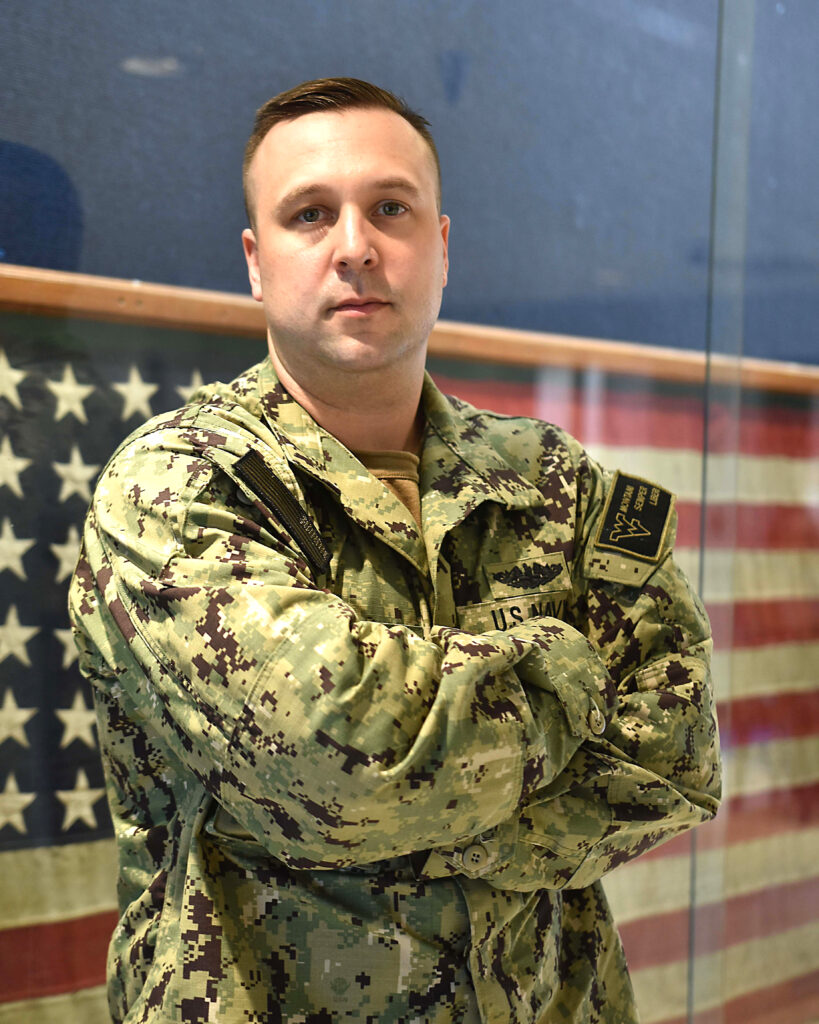
By Megan Brown,
Navy Office of Community Outreach
An Oxford native is serving aboard USS West Virginia, one of the world’s most advanced nuclear-powered submarines.
Petty Officer 2nd Class Kevin Friesmuth, a 2008 Oxford High School graduate, joined the Navy 10 years ago.
“I always wanted to serve,” said Friesmuth. “I was in college and I wanted to do something more. So, I went to a recruiter’s office and signed a contract to join the Navy.”
Today, Friesmuth serves as a missile technician, whose responsibilities include operating, maintaining and providing security for nuclear weapons and their associated missiles and support systems.
According to Friesmuth, the values required to succeed in the military are similar to those found in Oxford.
“I learned from Oxford that hard work pays off,” said Friesmuth.
Known as America’s “Silent Service,” the Navy’s submarine force operates a large fleet of technically advanced vessels. These submarines are capable of conducting rapid defensive and offensive operations around the world, in furtherance of U.S. national security.
There are three basic types of submarines: fast-attack submarines (SSN), ballistic-missile submarines (SSBN) and guided-missile submarines (SSGN).
Fast-attack submarines are designed to hunt down and destroy enemy submarines and surface ships; strike targets ashore with cruise missiles; carry and deliver Navy SEALs; conduct intelligence, surveillance, and reconnaissance missions; and engage in mine warfare.
The Navy’s ballistic-missile submarines, often referred to as “boomers,” serve as a strategic deterrent by providing an undetectable platform for submarine-launched ballistic missiles. SSBNs are designed specifically for stealth, extended patrols and the precise delivery of missiles.
Guided-missile submarines provide the Navy with unprecedented strike and special operation mission capabilities from a stealthy, clandestine platform. Each SSGN is capable of carrying 154 Tomahawk cruise missiles, plus a complement of heavyweight torpedoes to be fired through four torpedo tubes. As a member of the submarine force, Friesmuth is part of a rich 121-year history of the U.S. Navy’s most versatile weapons platform, capable of taking the fight to the enemy in the defense of America and its allies.
Serving in the Navy means Friesmuth is part of a team that is taking on new importance in America’s focus on rebuilding military readiness, strengthening alliances and reforming business practices in support of the National Defense Strategy.
“SSBN’s provide the blanket of freedom the world sleeps beneath,” said Friesmuth. “We are the silent service protecting people we don’t know. It is vital and it keeps our adversaries in check.”
With more than 90 percent of all trade traveling by sea, and 95 percent of the world’s international phone and internet traffic carried through underwater fiber optic, Navy officials continue to emphasize that the prosperity and security of the United States is directly linked to a strong and ready Navy. A major component of that maritime security is homeported at Naval Submarine Base Kings Bay.
“We do two big things . . . we send SSBNs on Strategic Deterrence Patrols and we forward deploy our guided missile submarines overseas,” said Rear Adm. John Spencer, Commander, Submarine Group Ten. “This work is essential to uphold the number one mission of the Navy: strategic deterrence. And this is the only home port for both of these types of submarines on the East Coast.”
Strategic deterrence is the Nation’s ultimate insurance program, and for decades, Kings Bay has been home to Ohio Class SSBN ballistic-missile submarines. Beginning in 2028, the new Columbia Class ballistic-missile submarines will arrive and provide continuous sea-based strategic deterrence into the 2080s.
As Friesmuth and other sailors continue to train and perform the missions they are tasked with, they take pride in serving their country in the United States Navy.
“Serving in the Navy means a career, but more than that, we are serving our country, protecting the free world and are able to have a higher sense of pride because of what we do,” added Friesmuth.

Leave a Reply